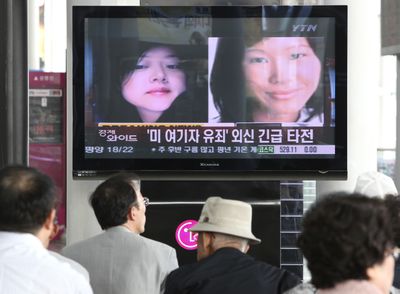Sentencing puts U.S. goals in peril
Journalists face grim future in N. Korea prison

SEOUL, South Korea – In seeking the release of two American TV journalists sentenced to 12 years of hard labor Monday by North Korea, the Obama administration faces difficult negotiations that could imperil its broader policy goals aimed at curtailing the authoritarian nation’s nuclear weapons ambitions.
But if no deal is reached, the two women face a grim future in a prison system notorious for its lack of adequate food and medical supplies and its high death rate.
Laura Ling and Euna Lee, reporters for San Francisco-based Current TV, were convicted by the nation’s top Central Court of an undefined “grave crime” against the hard-line regime after they were arrested in March along the China-North Korean border while reporting a story on human trafficking.
In a statement, the state-run Korean Central News Agency did not say where the women are to serve the time. North Koreans who receive similar sentences of “reform through labor” often face starvation and torture in a penal system many consider among the world’s most repressive, said David Hawk, author of the 2004 study “The Hidden Gulag: Exposing North Korea’s Prison Camps.”
Amid an international outcry, the White House said Monday it was “engaged through all possible channels” to seek the release of Ling, 32, and Lee, 36.
A top U.S. goal is to prevent the effort from being linked to the larger conflict over North Korea’s nuclear-weapons program. But the outcome of that effort is anything but certain, experts said.
“I think it very unlikely that the North Koreans would let them go without some serious extortion,” said L. Gordon Flake, a Korea expert and president of the Maureen and Mike Mansfield Foundation, a Washington think tank. “But giving in to that extortion would fundamentally undermine broader U.S. national security interests.”
The question of linkage might be the most important to the fate of the two women. U.S. officials fear that the North Koreans might attempt to make any reduction in their sentences dependent on what kind of punishment is imposed by the United Nations or by individual countries in response to North Korea’s recent nuclear detonation and missile tests.
Secretary of State Hillary Rodham Clinton said although the administration was “deeply concerned” about the length of the sentences, the U.S. differences with North Korea over its arms program are “separate and apart from what’s happening to the two journalists.”
However, by refusing to combine the two issues, analysts said the eventual release of the two women could be delayed.
If the pair are held for a lengthy period, analysts believe they may be sent to a “kyo-hwa-so,” or re-education reformatory, “that is the equivalent of a felony penitentiary in the U.S., as opposed to a county jail or misdemeanor facility,” Hawk said. “It’s extremely hard labor under extremely brutal conditions.”
U.S. officials acknowledged Monday that they have been discussing the idea of sending a high-level envoy to North Korea to seek the release of the women, following a pattern that was used to secure the release of American prisoners in the 1990s. But they said that no decision has been reached and suggested that some diplomatic groundwork might be necessary before such a step could be taken.
New Mexico Gov. Bill Richardson, who helped negotiate the release of U.S. prisoners in the 1990s and has been in discussions with the Obama administration, suggested in a “Today Show” interview that talk of an envoy is “premature because what first has to happen is a framework for negotiations on a potential humanitarian release. What we would try to seek would be some kind of a political pardon.”
Richardson has been mentioned as a possible envoy, as has former Vice President Al Gore, who is co-founder of Current TV, the San Francisco media company that employs Ling and Lee.
At the same time, Richardson said there may be reason for hope in that the North Koreans did not file espionage charges against the women.
He noted also that North Korea had not yet explicitly linked discussions of the women to negotiations over broader U.S. North Korean disputes.
The families of the two prisoners expressed shock at the sentences.
“We are very concerned about their mental state and well-being,” they said in a statement. “Laura has a serious medical condition that is sure to be exacerbated by the drastic sentence.
Euna has a 4-year-old daughter who is displaying signs of anguish over the absence of her mother. We believe that the three months they have already spent under arrest with little communication with their families is long enough.”
As American officials weigh options, experts with knowledge of the impoverished nation’s penitentiary system stress that time is of the essence.
“The first thing that passed through my mind when I heard about the verdict was that, from an American perspective, this is tantamount to a death sentence,” said Scott Snyder, director of the Center for U.S.-Korea Policy for the Asia Foundation, a Washington-based think tank.
“There aren’t a lot of guarantees in that type of environment.”